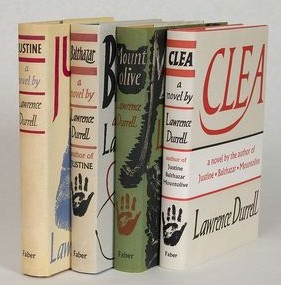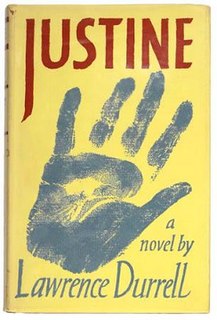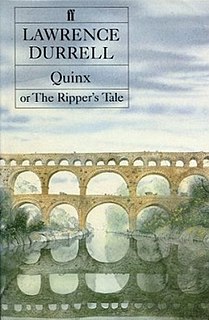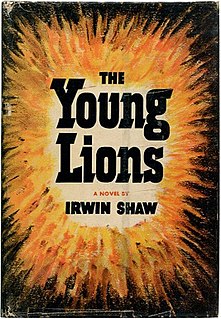
Lawrence George Durrell was an expatriate British novelist, poet, dramatist, and travel writer. He was the eldest brother of naturalist and writer Gerald Durrell.

My Family and Other Animals (1956) is an autobiographical book by British naturalist Gerald Durrell. It tells in an exaggerated and sometimes fictionalised way of the years that he lived as a child with his siblings and widowed mother on the Greek island of Corfu between 1935 and 1939. It describes the life of the Durrell family in a humorous manner, and explores the fauna of the island. It is the first and most well-known of Durrell's Corfu trilogy, which also includes Birds, Beasts, and Relatives (1969) and The Garden of the Gods (1978).

The Alexandria Quartet is a tetralogy of novels by British writer Lawrence Durrell, published between 1957 and 1960. A critical and commercial success, the first three books present three perspectives on a single set of events and characters in Alexandria, Egypt, before and during the Second World War. The fourth book is set six years later.

Constantine Peter Cavafy was a Greek poet, journalist and civil servant from Alexandria. He was also a homosexual whose work, as one translator put it, "holds the historical and the erotic in a single embrace."

Justine, published in 1957, is the first volume in Lawrence Durrell's literary tetralogy, The Alexandria Quartet. The first in the tetralogy, Justine is one of four interlocking novels, each of which tells various aspects of a complex story of passion and deception from differing points of view. The quartet is set in the Egyptian city of Alexandria in the 1930s and 1940s, the city or Alexandria itself as described by Durrell becoming as much of a complex character as the human protagonists of the novels. Since first becoming available to the public and reviewers in 1957, Justine has inspired what has been called "an almost religious devotion among readers and critics alike." It was adapted into the film of the same name in 1969.
The Durrell family was an English family, two of whose members were best-selling writers. It has been the subject of several autobiographies, the TV series My Family and Other Animals (1987), the television film My Family and Other Animals (2005), the largely fictionalized TV series The Durrells (2016–2019), and the documentary What the Durrells Did Next.

Justine is a 1969 American drama film directed by George Cukor and Joseph Strick. It was written by Lawrence B. Marcus and Andrew Sarris, based on the 1957 novel Justine by Lawrence Durrell, which was part of the series The Alexandria Quartet.

Monsieur, or The Prince of Darkness (1974), is the first volume in Lawrence Durrell's The Avignon Quintet. Published from 1974 to 1985, this sequence of five interrelated novels explore the lives of a group of Europeans before, during, and after World War II. Durrell uses many of the experimental techniques of metafiction that he had integrated into his Alexandria Quartet, published 1957 to 1960. He described the later quintet as a quincunx.

The Revolt of Aphrodite consists of two novels by British writer Lawrence Durrell, published in 1968 and 1970. The individual volumes, Tunc and Nunquam, were less successful than his earlier The Alexandria Quartet, in part because they deviate significantly from his earlier style and because they approach more openly political and ideological problems.
The Avignon Quintet is a five-volume series of novels by British writer Lawrence Durrell, published between 1974 and 1985. The novels are metafictional. He uses developments in experimental fiction that followed his The Alexandria Quartet (1957-1960). The action of the novels is set before and during World War II, largely in France, Egypt, and Switzerland.

Balthazar, published in 1958, is the second volume in The Alexandria Quartet series by British author Lawrence Durrell. Set in Alexandria, Egypt around World War II, the four novels tell essentially the same story from different points of view and come to a conclusion in Clea. Balthazar is the first novel in the series that presents a competing narrator, Balthazar, who writes back to the narrating Darley in his "great interlinear."

Mountolive, published in 1958, is the third volume in The Alexandria Quartet series by British author Lawrence Durrell. Set in Alexandria, Egypt, around World War II, the four novels tell essentially the same story from different points of view and come to a conclusion in Clea.Mountolive is the only third person narrative in the series, and it is also the most overtly political.

Livia, or Buried Alive (1978), is the second volume in British author Lawrence Durrell's The Avignon Quintet, published from 1974 to 1985. Durrell has described the novels as "roped together like climbers on a rockface, but all independent. .. a series of books through which the same characters move for all the world as if to illustrate the notion of reincarnation." The description of this form for the quintet actually appears in Livia. The first novel of the quincunx, Monsieur, received the James Tait Black Memorial Prize in 1974.

Constance, or Solitary Practices (1982) is the central volume of the five novels of Lawrence Durrell's The Avignon Quintet, published from 1974 to 1985. It was nominated for the Booker Prize in 1982. Involving some of the characters from the preceding Livia, the novel also introduces new ones. It is set before and during World War II, in France, Egypt, Poland and Switzerland.

Quinx, or The Ripper's Tale (1985), is the 5th and final volume in Lawrence Durrell's "quincunx" of novels, The Avignon Quintet, published from 1974 to 1985. It explores the activities of Constance, Aubrey Blanford, Robin Sutcliffe, Lord Galen, and most of the other surviving characters as they return to Avignon and Provence in the immediate aftermath of World War II.

The Young Lions (1948) is a novel by Irwin Shaw about three soldiers in World War II.
Clea Badaro (1913–1968) was an Egyptian painter and designer who lived most of her adult life in Alexandria, Egypt.
Richard Leslie Beswetherick Pine is the author of critical works on the Irish playwright Brian Friel, the Anglo-Irish novelist Lawrence Durrell, and aspects of art music in Ireland. He worked for the Irish national broadcaster RTÉ Raidió Teilifís Éireann before moving to Greece in 2001 to found the Durrell School of Corfu, which he directed until 2010. In 2012, to mark the centenary of the birth of Lawrence Durrell, Pine edited and introduced a previously unpublished novel by Durrell, Judith, set in 1940s Palestine. From 2009 to 2020 he wrote a regular column on Greek affairs in The Irish Times and was also an obituarist for The Guardian. Lawrence Durrell described Pine's work as "the best unpacking of my literary baggage I have heard."
Anne Goodwin Winslow was an American novelist and short-story writer who published her first work of prose at the age of 68.














